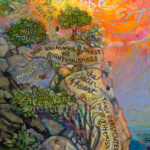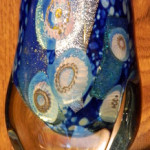
Blessed are the merciful for they shall be shown mercy,
Jesus says, articulating a law which underlies the physical universe
—and human life. What you sow you reap.
I know some gentle merciful ones, and indeed, they are blessed,
beloved, in demand. The kindness they sow, the thoughtfulness
comes back to them with compound interest.
Their lives are relatively free from the interpersonal conflicts
and enmities which mar so many lives.
The natural law of sowing and reaping: What you plant in
the soil of your life, after a brief or lengthy period of dormancy,
inevitably flows back to you, thorns and nettles, or apples
and cherries. Life returns sunshine for goodness sown
and darkness and trouble for darkness and trouble sown.
(Of course, the merciful are not immune from suffering,
in this fallen, cracked world–human greed polluting our
environment, and our very cells, and greedy people swindling us.
Besides, there are demonic “principalities and powers,
spiritual forces of evil” contending for the soul and shalom
of good people such as Job, or many faithful Christians today.)
But, in the main, those who go through life lightly,
making allowances for human weakness, being kind
in reviews, in tipping, in how they secretly judge others,
and what they say to or about them, meet with somewhat
the same gentleness as they go through life. And mercy
is what we need, we frazzled, frail, forgetful creatures,
whose spirit is willing, but whose flesh is weak, who
can so easily give way to unkindness and impulsively say
and do things we regret. We need mercy as we pilgrim
through life, and so we must rigorously train ourselves
to dish it out: Mercy, mercy, mercy.
Blessed are the merciful, Jesus says, using the word makarios,
Or happy. What is the opposite of being happy or blessed?
It is to be unhappy, to live with the hatred or curses of others
because of one’s dishonest or cruel actions. Being unmerciful, and
misusing power is an addictive dark pleasure which corrupts
the heart, soul, mind, and body, creating molecules of cortisol
and adrenaline in our brains and body, changing their very chemistry.
Those who step out of God’s protection with cruelty
and unmercifulness inevitably find thorns, thistles
and stumbling blocks on their path through life.
However, sowing and reaping, the merciful finding mercy,
while the unmerciful find misery is a terrifying message
for us who have not always been merciful, I among them.
So we, who have been unmerciful in speech, in writing,
in our actions, must repent and ask God for forgiveness.
And He will forgive. For in the Supreme Court of God,
who is the righteous judge of all the world, Jesus Christ,
who is love, voluntarily bore the punishment, the sentence,
that the just laws of the universe, of sowing and reaping,
demand that we suffer. He bore the penalty for our
eviscerating words, our meanness, our stinginess.
And in what theologians call the divine exchange, because
he bore the punishment, streams of mercy can flow to us,
streams of good ideas, comfort, the certainty of God’s love,
the certainty of being his beloved child. And the more we cling
to Jesus by faith, reading, meditating on, and almost eating
his life-changing words, the more we experience change
in the deep structure of our characters, not just in what we do,
but in who we are, in the secret places of the heart.
So go through life with as much kindness as you can
while being as wise as a serpent and as blameless as a dove.
Repent of past unmercifulness, and decide once again to follow
Jesus, to dwell in Jesus, hide yourself in Jesus, and to be merciful.
And the love of God, and the abundance of his household
Will flow into you and through you to the world that God so loves.
Becoming merciful will mean a massive change in the deep structure
Of our hearts and our characters. It is partly a decision.
However, changing who we are needs the Spirit of Jesus in us,
changing us. It needs Jesus himself within us, changing us. So come,
Lord Jesus. We welcome you in. Change us.
Holy Spirit, please come. Change us.
Veni Sancte Spiritus.
Amen.
This is a meditation on Matthew, Chapter 5
I would love you to read my memoir, fruit of much “blood, sweat, toil and tears.”
Rosaries, Reading, Secrets: A Catholic Childhood in India in the UK, and in the US, here, well, and widely available, online, worldwide 🙂
If you’d like to follow these meditations the moment they appear, please subscribe to Christian Meditation with Anita Mathias at Apple Podcasts, Spotify or
or Audible.
And I would be grateful for reviews and ratings!!
If you’d like to read my previous recorded meditations,
7 The Power of Christ’s Resurrection. For Us. Today
6 Each Individual’s Unique and Transforming Call and Vocation
5 Change Your Life by Changing Your Thoughts
4 Do not be Afraid–But be as Wise as a Serpent
3 Our Failures are the Cracks Through Which God’s Power Enters our Lives
2 The World is full of the Glory of God
1 Mindfulness is Remembering the Presence of Christ with us.
Thank you 🙂
















